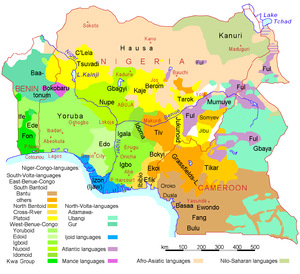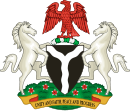
Back নাইজেরিয়ার ভাষা Bengali/Bangla Sprachen Nigerias German Lingvoj en Niĝerio Esperanto Langues au Nigeria French Harsunan Najeriya Hausa Fiteny ao Nizerià Malagasy Línguas da Nigéria Portuguese Языки Нигерии Russian Мови Нігерії Ukrainian Àwọn èdè Nàìjíríà Yoruba
| Languages of Nigeria | |
|---|---|
 A map of languages in Nigeria and neighboring countries | |
| Official | English |
| National | Hausa, Igbo, Yoruba |
| Regional | Ibibio, Efik, Isoko, Edo, Tiv, Fulani, Idoma, Ijaw, Kamwe, Kanuri, Ukwuani, Urhobo, Nupe, Gbagyi |
| Vernacular | Nigerian Pidgin |
| Foreign | Arabic, French |
| Signed | |
| Keyboard layout | |
| This article is part of a series in |
| Culture of Nigeria |
|---|
 |
There are over 520 native languages spoken in Nigeria.[1][2][3] The official language is English,[4][5] which was the language of Colonial Nigeria. The English-based creole Nigerian Pidgin – first used by the British and African slavers to facilitate the Atlantic slave trade in the late 17th century[6] – is the most common lingua franca, spoken by over 60 million people.[5][7]
The most commonly spoken native languages are Hausa (over 63 million when including second-language, or L2, speakers), Yoruba (over 47 million, including L2 speakers), Igbo (over 31 million, including L2 speakers), Ibibio (over 10 million, including L2 speakers), Ijaw cluster (over 5 million), Fulfulde (13 million), Kanuri (4.6 million), Tiv (5 million), and approximately 2 to 3 million each of Nupe, Karai-Karai Kupa, Kakanda, Edo, Igala, Mafa, Idoma and Efik.[8] Nigeria's linguistic diversity is a microcosm of much of Africa as a whole, and the country contains languages from the three major African language families: Afroasiatic, Nilo-Saharan and Niger-Congo. Nigeria also has several as-yet unclassified languages, such as Centúúm, which may represent a relic of an even greater diversity before the spread of the current language families.[9]
- ^ "Language data for Nigeria". Translators without Borders. Retrieved 2022-12-12.
- ^ "Nigeria". Ethnologue. Retrieved 2017-07-14.
- ^ Blench, Roger (2014). An Atlas Of Nigerian Languages. Oxford: Kay Williamson Educational Foundation.
- ^ "Language data for Nigeria". Translators without Borders. Retrieved 2022-12-12.
- ^ a b "Nigeria: languages by number of speakers 2021". Statista. Retrieved 2023-02-24.
- ^ "BBC starts Pidgin digital service for West Africa audiences". BBC News. 21 August 2017. Retrieved 16 February 2018.
- ^ "Africa: Nigeria". The World Factbook. Central Intelligence Agency. Retrieved 2020-06-21.
- ^ "Nigeria". worldpopulationreview.com. Retrieved 2020-05-30.
- ^ Adeleke, Dr Wale. "Languages of Nigeria - Regions". NaijaSky. Retrieved 2020-05-27.
